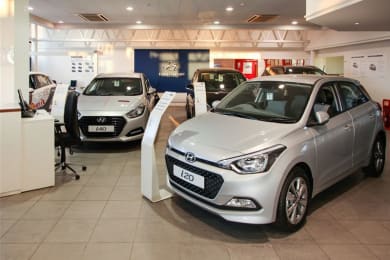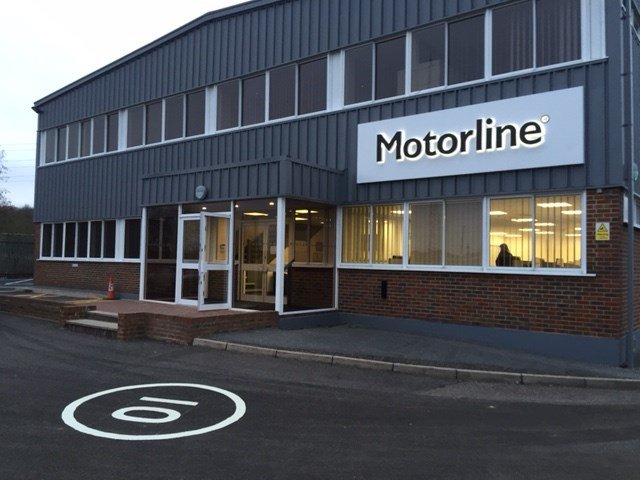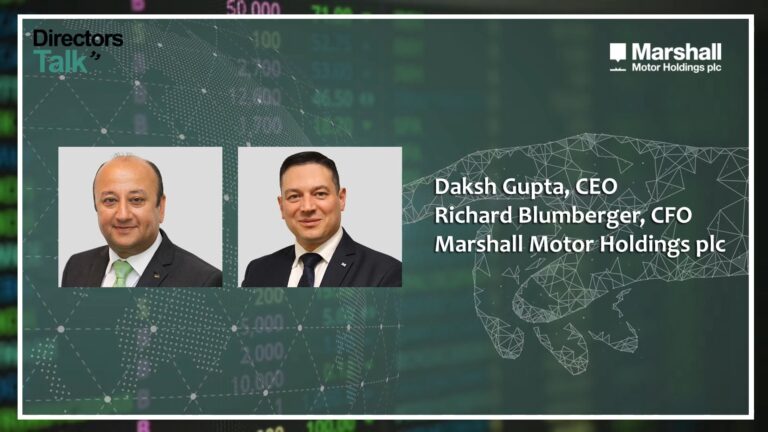Marshall Motors Holdings plc (LON:MMH) Chief Executive Officer Daksh Gupta and Chief Financial Officer Richard Blumberger caught up with DirectorsTalk for an exclusive interview to discuss their strong market outperformance and strategic growth.
Q1: Daksh, we’ve seen your announcement this morning, looks like a good performance considering challenging market conditions. Could you just talk us through the highlights?
A1: So, really pleased to report this morning a strong set of results in 2019, especially when you consider the continued challenging market conditions. We’ve delivered another strong out-performance against the markets across all of our key operational metrics. So, we outperformed the total new, new retail, new fleet, and used car markets so a clean sweep across the board. So, an excellent result.
Our like-for-like total new unit sales grew by 0.3%, and this was a pleasing result when you consider market conditions. Like-for-like new retail unit sales were down 2.2%, but ahead of the wider UK market, which was down 3.2% & our fleet performance was strong, up 4.5% on our like-for-like basis, which compares to a market that was down 1.7%. Now it’s worth flagging that I’m actually comparing unit sales against market registrations, which of course, includes the impacts of dealer self-registrations, which can distort the market.
Aftersales continue to enjoy good growth, with like-for-like revenues up 3.2% & we enjoyed another record used car performance. On a like-for-like basis, used unit sales were up 6.1%, a significant out-performance to the market which was down 1.7% & this builds on consecutive years of record results.
We also invested £31.6 million in 20 new businesses, and this helped revenues hit record revenues for the group, which was £2.3 billion & on a like-for-like basis, revenues were up for a fifth successive year since IPO, to £2.2 billion, which was up 2.2%. That was another pleasing result given the market conditions.
Like-for-like operating profit, at £33.1 million, was down 4.1% & our total underlying profit before tax, at £22.1 million, was down 10.8%. However, this number included absorbing the losses from acquisitions we made through the year, and the first time adoption of IFRS 16 which we’d flagged previously. Board has also recommended a final dividend of 5.69 pence, and this takes the full year dividends, at 8.54 pence, which is in line with the previous year.
Finally, the group was also ranked for a fifth year running in the UK’s Best Workplaces, something we’re very proud of.
So, in summary, another strong market out-performance and strategic growth of the group so very, very pleased.
Q2: Now you mentioned that you’ve added 20 businesses last year, could you add a bit more colour of what you’ve been doing there?
A2: So, I’ve just said, we’ve invested £31.6 million into 20 new businesses & we did that through eight acquisitions or start-ups. I won’t go through each and every single one of them, but I’ll just talk about some of the key highlights from those acquisitions.
We added two Honda franchises in Reading and in Newbury, markets which we’re quite well versed in because we’re well represented there already & this takes our representation for Honda to eight. We acquired our ninth Volvo franchise in Derby, and this further cemented our number one position with Volvo.
However, the most significant development here was our expansion with Volkswagen Group. Not only were we awarded an open-point in Lincoln, but we also had the great opportunity to do multiple acquisitions, which added 14 franchises in total. As a result of those additions, Marshall Motor is now the largest partner for Volkswagen Group in the UK for Volkswagen passenger cars, Volkswagen commercial vehicles, and Skoda.
To put that into perspective, we now have 14 Volkswagen Passenger car franchises, 7 Volkswagen Commercial, 9 Audi, 12 Skoda, 3 Fiat, and 5 trade parts specialists for the group. I’m really pleased with this, as we only gained our first Volkswagen franchise in 2012 & I think this clearly demonstrates our operational capabilities and manufacturer relationships.
One of our key parts of our strategy is to partner with the right brands in the right market, and I’ve got absolutely no doubt whatsoever that these additions fall into that category particularly when you look at their market share and the scale of investments that some of these brands are making.
Really pleased with the integration, that’s going really well & all of the early signs are quite encouraging.
Q3: Now, Richard, some good top line growth there, as Daksh has mentioned. Could you talk us through the highlights of the financials?
A3: So, as you heard, 2019 was a challenging year for the market in general, with all aspects of the operation declining, but against that backdrop, the group has performed well with record revenues and did have a strong out performance against the market, with like-for-like revenues up 2.2% to £2.2 billion.
Our like-for-like gross profit did see a little bit of pressure, but it was up 0.8% to £252.3 million & the gross profit percentage holding strong at 11.4%, and that’s only 17 basis points down on last year.
In the year we had strong margin performance in the new car segment & we feel that really justifies our mantra of retailing to the right targets, that’s minimising the need for us to pre-register. Our like-for-like gross profit increased 3.5% on new, or £2.6 million to £78 million, and gross profit percentage was up 27 basis points to 7.4%.
As we stated at the interims, used car margins were impacted by the RV pressures that we experienced in the market, especially in Q2 & although the second half margins stabilised, and indeed showed a slight improvement, overall for the year, we saw margins down 47 basis points to 6.7%. The continued focus on our stock profiling enabled us to really minimise the impacts of that margin pressure.
Like-for-like after-sales gross profit was broadly flat at £110.8 million, with gross profit percentage back 127 basis points & this was largely due to the fact that we experienced an increased part sales mix, which had a lower margin attributable to it.
On operating expenses, we faced strong headwinds, such as property and investment costs, which has impacted depreciation in addition to fixed salary costs and subcontractor costs. A good example of this is the auto enrolment rate change, and that costs us about £600,000 pounds in a year on a like-for-like basis. But against this, we continue to have our structured cost controls in place and increased our focus around discretionary spend areas & this really enabled us to control our like-for-like expenses which increased just 1.5% in the year. So overall that left operating profit at £33.1 million and underlying PBT at £22.1 million.
If we look at our balance sheet, this strengthened further with now £202.3 million in net assets and that’s underpinned by strong freehold land and buildings of £124.9 million. I think it’s also worth adding at this stage that we did an independent valuation of our property portfolio & that shows the market value of the property portfolio, excluding investment properties, actually being £15 million above output value.
We closed the period with £30.6 million in net debt and that was driven by the continued investment for growth, both of the acquisitions we made throughout the year and our continued capital expenditure program. We also had a working capital increase as a result of strong fleet volumes, especially in December.
It’s worth remembering that we also paid out £5.6 million to clear our defined benefits pension exposure 2018 revised dividend policy resulted in an extra 2.2 million pounds out for the year but despite this, our leverage remained low.
Q4: Now, Richard, just staying on acquisitions and capital investment for the moment, could you just talk us through the financial dynamics?
A4: So, if we talk about the capital allocation in the year, I think throughout the year we continue to invest in growth and to build on our platform for the future & a further reflection of the strength group. We spent over £30 million in acquisitions, and that including the freehold purchases of North Hampton Skoda, St. Albans VW, Letchworth VW, and Derby Volvo. It’s also worth mentioning that these acquisitions are earnings dilutive in 2019, 2020, and 2021 & we expect them to be earning enhancing from 2022 onwards.
We spent a further £15 million that was invested into our asset base & in recent years, we’ve invested significantly in our project portfolio, spending over £100 million pounds. These proven investment is nearing an end and as a result we expect to see capex reduce significantly and free cashflow increase from 2021 onwards.
We continue to invest in developing our software capability including our Phoenix 2 system & we continue to grow and invest further sums of money into people, infrastructure to ensure the business is set up for growth. To further future proof the business, the group spent nearly £6 million to eliminate any future pension risk and this has previously been communicated & finally, we returned £7 million to shareholders
So, as you can see, it’s been a busy year of investment for the group, which leaves us with a fantastic platform to further grow the business.
Q5: Richard, you’ve done some acquisitions and you’ve now got some down on the balance sheet. You mentioned that you have a fantastic platform to further grow the business, but what fire power do you still have?
A5: I think it’s worth remembering that the group is very, very cash generative. During the year we had significant cash inflows from operating activities before expenditure on investments and dividends & the business generated £42 million of EBITDA, which after tax, interest and capital movements, left £28.9 million pounds of cash generated in the period from operations. This cash was invested in capital expenditure and acquisitions in the year, so we saw an outflow £46.8 million for these activities & also, we distributed £7 million of dividends to our shareholders.
So, all of that left a net debt position of £30.6 million pounds but despite the investments in 2019 on both growth capital expenditure and acquisitions, the group did close the year of leverage at less than 1 times EBITDA. We have significant more headroom to grow if the right investment opportunities arise and we have unutilised funds from our revolving credit facilities and supportive shareholders.
What I would say, as we’ve consistently said, the group will only make the acquisitions which fit with our strategy of the right brands in the right markets.
Q6: Now, Daksh, lots of industry coverage out there at the moment about emissions, electrification, network restructuring, and so on. Can you share your thoughts on this?
A6: Yes, obviously there’s a lot going on there. I think first and most significantly of all is what’s going with climate change and the sentiment towards that & clearly regulation relating to that is obviously forcing the industry to move towards zero emissions by 2050. I think it’s important to note this is going to be an evolution over the next 20 to 30 years, not an overnight revolution.
It’s worth saying that from 2020 under the Clean Air for Europe regulations, known as CAFE, punitive penalties will be introduced for OEMs & this regulation requires OEMs to achieve average emissions across their vehicle sales of not more than 95 grams of CO2 per kilometre. Failure to achieve these targets will result in significant fines & the only way that OEMs can achieve these targets is through electric vehicles and this will require significant investment.
A good example of that is Volkswagen Group. They are investing €66 billion in their future electrification & you can now understand why I’m super excited to be their biggest partner in the UK. However, many brands will not be able to invest on this sort of scale and will come under pressure to meet these requirements & therefore, we will see OEMs form partnerships, alliances, consolidate, or even leave markets, of course, we’ve witnessed that in recent years.
In addition to support their investment requirements, OEMs are seeking to reduce cost and this includes within their distribution network of which we form part. Now, this will result in rationalisation of retailers to protect viability & of course, the last two years we’ve seen three major manufacturers announce significant cuts to their network.
Now OEMs do this because there is a symbiotic relationship between them and their retailer network, quite simply they need us to be profitable, as we’re an extension of their business & this should over time drive a higher throughput, precisely as we’ve seen in recent years, and ultimately increase profitability.
Worth saying that we partner with 18 brands out of 41 in the UK, however, our 18 represents over 80% of the market, which means the other 23 brands represent on average less than 1% of the market & it’s many of these brands I believe will come under pressure that I was just talking about.
So, in summary on this particular topic, I think we feel very confident, the group has a solid platform that has been built over many, many years. We’ve got a great MNA track record, we’ve an amazing culture in the business, we’ve got great systems which are industry-leading, fantastic manufacturer relationships & you’ve just heard from Richard about our strong asset base and cash generations.
Manufacturers need and want groups such as Marshall Motor to lead on this journey and we feel very confident we’re very well placed for the future.
Q7: Just talking about the future, what is the outlook for the remainder of the year? And perhaps beyond?
A7: So, if you look at 2020, the latest forecast for the new car market according to the SMNT, is a decline of 2.6% & the used car market is forecast to decline by 1.4%. Now it’s worth flagging on new car sales, there was some fall forward into December as a result of those CAFE emission regulations, I was just talking to you about a minute ago, & we could see some fall forward into March as a result of company car tax for VED increases in April.
It’s still clearly early, in terms of March, but what I would say is our March order bank is encouraging and building in line with our expectations & obviously, March is key for delivering the first half, & of course the full year.
Finally, given the wider political and economic uncertainty surrounding the ongoing trade negotiations with the EU, the board believes it’s right to remain cautious & of course, in respect to COVID-19, so far, we haven’t seen an impact to date but clearly the board is monitoring the situation day by day and watching it quite closely.
However, the Marshall Motor Holdings board’s outlook remains unchanged.







































